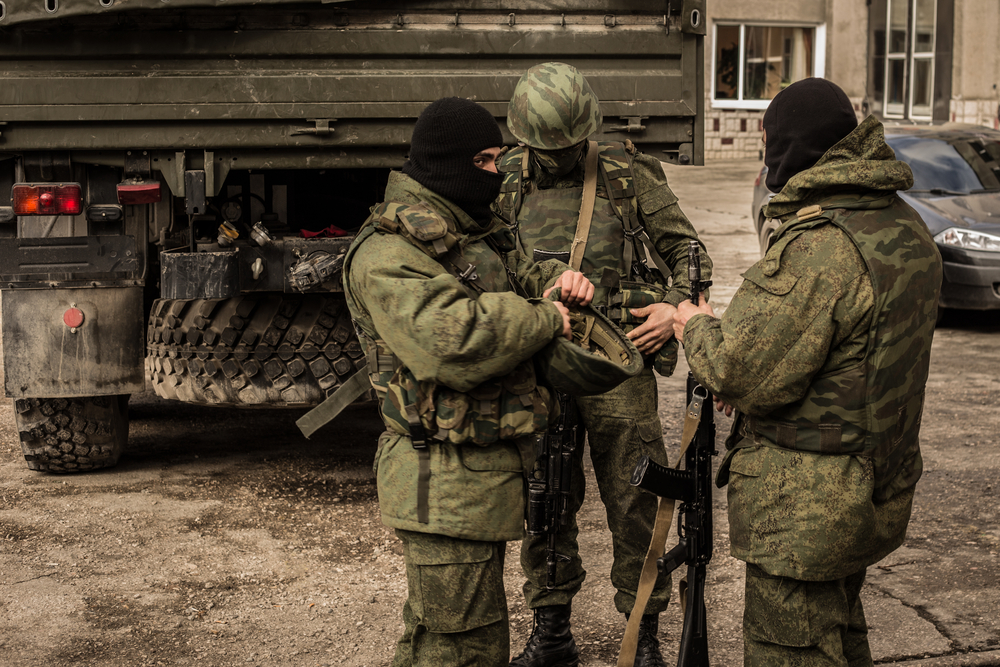Headline
Mayor held hostage by militant men in eastern Ukraine

MARCH 5 2014: Russian troops without chevrons and distinctive signs, near of the truck without license plates (March 5, 2014) Sergii Morgunov / Shutterstock
SLOVYANSK, Ukraine — When armed men seized the police station in this eastern Ukrainian city, mayor Nelya Shtepa declared she was on their side. She changed her story a few days later. Then she disappeared – the victim of an apparent abduction by the man who now lays claim to her job.
On Tuesday, she resurfaced, expressing support once again for the pro-Russia insurgents – but possibly no longer as mayor.
The mayoral mess, which pits the flamboyant leopard print-clad Shtepa against a mysterious rival who favors black baseball caps, reflects the anger, confusion and lawlessness that have gripped eastern Ukraine as armed groups opposed to the country’s interim government seize police stations and government buildings.
In town after town in the beleaguered east, it’s hard to tell who’s in control – and the situation in Slovyansk is just one of the most dramatic examples. Since the unrest began, pro-Russia insurgents have adopted a strategy of electing so-called people’s leaders: mayors and regional governors who claim to represent the people’s will, despite their questionable background and skills for the job. One reportedly is under criminal investigation, another is an Internet blogger.
Caught in the middle of the turmoil are bewildered and anxious residents, for whom daily life proceeds blocks away from seized buildings surrounded by barricades and manned by masked gunmen.
“We’re tired. We need only one thing: peace and quiet. It’s not important who guarantees it, Moscow or Kiev,” said cook Irina Grivets.
The man who now claims to be mayor says Shtepa was under the care of his comrades in the pro-Russia forces. But Vyacheslav Ponomarev is himself a dubious figure: No one seems to know his past and Ponomarev refuses to give any clarification.
Shtepa, famous for her platinum-blond hair, championed the insurgents’ cause when they seized the police station on April 13 – saying she agreed with their demands of holding a referendum on the region’s status.
“These are not some kind of out-of-towners from western Ukraine,” Shtepa, dressed in a bright pink down jacket and high heels, told a crowd through a loudspeaker, as masked men in body armor cheered her on.
But as central authorities dispatched troops and military vehicles to retake the buildings and key infrastructure facilities in the east, Shtepa quickly changed course. She called the men insurgents and their presence an “occupation.” She complained that they had seized and demolished her office and began referring to army troops dispatched by the Kiev government to fight the gunmen as “our, Ukrainian troops.”
Shtepa explained her U-turn, saying that she had pretended to be on the gunmen’s side in order to free dozens of hostages from the buildings that the insurgents stormed.
Speaking on a popular TV show last Wednesday, Shtepa complained of lootings by the insurgents and claimed that they were the Russian military: “Today, these already are Green Men,” Shtepa said in a reference to military men aligned with Moscow. Little is known about the armed men other than their pro-Russia sentiments; it’s not even clear whether they are Russian or Ukrainian or a mixture of both.
The following morning, she walked into city hall for a meeting with Ponomarev – and wasn’t seen again for five days.
On Tuesday, the Russian news site LifeNews ran a video interview with her – in what the site said was her former office – praising the insurgents as men with “strong souls” and thanking Russian President Vladimir Putin for annexing Crimea. The report also showed what it said was a resignation letter that Shtepa willingly signed.
Unlike Shtepa, who was elected in 2010, Ponomarev’s identity is a mystery to everyone.
By his own account, he served in the Soviet army and in special forces after the fall of the Soviet Union. Until recently, he was running a tailor’s shop and now heads a company that produces soap. Asked about the specifics, or even his residence and citizenship, he typically answers: “I’m not going to tell you.”
Tanned and rugged like a construction worker, Ponomarev sounds like a military man although his accent is difficult to pin down and it’s not clear whether he has any ties to Slovyansk.
He is usually seen in an entourage of masked gunmen and two women, one of whom is a local lawmaker. The women seem to be clueless about Ponomarev’s past, too.
Ponomarev brushes off questions about his legitimacy or even details of how he was elected. Residents seem to be unaware of exactly how the army veteran came to replace the middle-aged woman and are only praying the stand-off will end.
“Under Shtepa, things were quiet and the streets were clean,” said teacher Andriy Khoronenko. “Now we’ve got barricades and drunken activists with automatic rifles and Russian flags. How am I supposed to feel about it?”
Maria Danilova contributed to this report from Kiev.





















